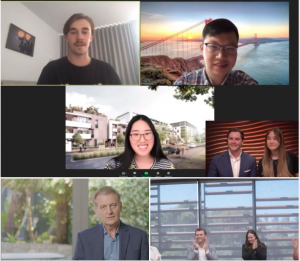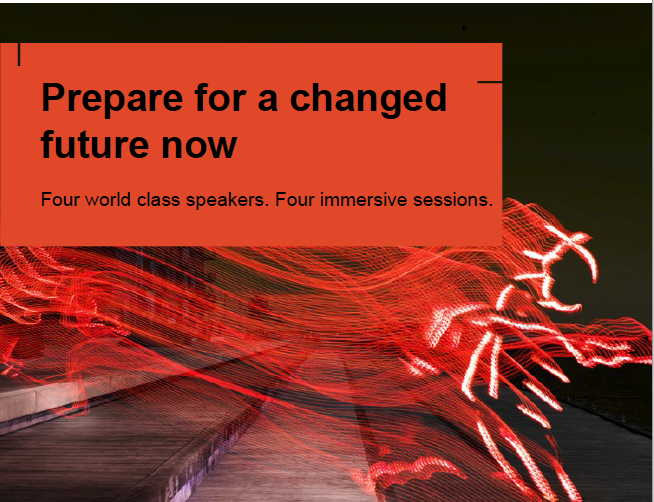The global, local and personal challenges facing students engaging in their university studies in 2020 cannot be underestimated. The immediate impacts of the pandemic on their learning, social interaction and career development presented a pedagogical challenge for the Business School. At scale, how can we support our students to develop critical skills and connections they can use to better transition into life and work in a post-COVID economy? How could we develop the soft skills necessary for interacting, building relationships and making a difference in this ‘never normal’ world?
An innovative cross-curricular online program
The Leading in a Post-COVID World (LPC) program was designed to offer all Business School students a unique opportunity to be a part of an aspirational movement for personal and global change. We designed an intra-curricular program that scaffolded and contextualised the knowledge and skills students had and were experiencing in their units of study, developing their leadership skills for a post-COVID society. LPC was a large-scale online program involving 1400 students, built on four masterclasses delivered by inspirational and challenging thought leaders, accompanied by a fireside chat between senior academics, influential industry leaders and Business School alumni debating the issues emerging from the masterclass.

Students engaged in interactive workshops designed to transition them between personal reflections and collective action, with activities ranging from leading in volatile and complex situations, rebuilding broken industries like air travel, and supporting the deployment of a COVID vaccine at scale. Each of the four sequences was repeated throughout the semester to allow students the opportunity to engage with the program at a time that suited them. This flexible (and discontinuous) delivery approach was a unique way to support learners studying in complex and unfamiliar situations online. After the completion of the masterclasses, the learners came together in small groups to collectively design and pitch their solutions to critical global and local challenges such affordable housing, the future of higher education and empathetic leadership. These pitches were presented at the “Business Not As Usual” forum attended by their peers and academic staff where the best pitches were evaluated by a panel of alumni.
Key design insights
- Designing for multiple entry points and varied pathways through learning. LPC used catch up workshops, storyboarded and multi-voiced media, peer mentoring and regular student interaction and communications to support students working at their own pace through the program. Students commenced at the same time but were able to prioritise other activities outside the program and step back in when they had time, increasing engagement.
- Authentic assessment and peer feedback. The pitches, the challenges and the solutions students were asked to develop were real and authentic and were built not just on hypothetical actions but on actions that the groups would take immediately to address critical challenges. Students were provided with both peer feedback prior to submission and detailed verbal feedback from alumni and their peers during the pitch.
- Visual Rhetoric. The use of visual images to define and share challenges and perspectives was at the core of the pedagogical design. From the deployment of striking imagery throughout the platforms through to asking students to represent their 2020 lived experiences as a book cover and share it with the cohort, the persuasive power of the image was key to helping students share their own reflections on leading in accessible ways.
- Real soft skills. The workshops were delivered on a pilot instance of Microsoft Teams. Students gained skills on a platform that is now standard in workplaces globally (including ours). The platform allowed them to move back and forward in the workshop (especially when a tool like Sway was used to deploy a digital storytelling approach), they could have backchannel conversations with colleagues or tutors and they could undertake their groupwork in channels and groups supported by multimedia and collaboration tools.
- Community learning. Our students became part of the LPC community. They sought opportunities to engage with other members. All our community who completed the program received a badge indicating their achievement. Designing learning where students are part of something (and not the passive receivers of learning) is a challenge especially online, but one we feel we were able to successfully achieve.
Benefits for students
I went into the degree thinking ‘I need to pivot’ – and this was even prior to COVID. So I was hoping it would help me … not only has LPC helped but has been part of my recent interview process and has clarified my thinking about my career. That’s the value that you get out of a course like this.
Despite the short development lead-in (six weeks from approval of funding to the first masterclass going live) and the agile delivery timetable, LPC was an incredibly successful model in delivering engaged, innovative and challenging online learning at the University and at scale. Students have commented that the program has changed their thinking about their future in a post-pandemic society. They have debated issues of substance and are now able to tell a story of what they did during this tumultuous pathway to finding the never normal. LPC was truly an example of using our capacity as educators to instil leadership for good in our students.





